 Samantha Gross (@samanthaenergy), Fellow in the Cross-Brookings Initiative on Energy and Climate: The attack on oil facilities in Saudi Arabia over the weekend was a direct attack on the heart of the Saudi economy and the global oil system. The damaged facilities are central to Saudi ability to export crude oil and removed 6% of global crude supply from the market. However, the facilities have significant excess capacity and were not destroyed, so the Saudis may be able to restore exports relatively quickly. Time will tell.
Samantha Gross (@samanthaenergy), Fellow in the Cross-Brookings Initiative on Energy and Climate: The attack on oil facilities in Saudi Arabia over the weekend was a direct attack on the heart of the Saudi economy and the global oil system. The damaged facilities are central to Saudi ability to export crude oil and removed 6% of global crude supply from the market. However, the facilities have significant excess capacity and were not destroyed, so the Saudis may be able to restore exports relatively quickly. Time will tell.
From an energy security perspective, the Trump administration has been telling us that the United States is now “energy dominant” and that we no longer need Middle East oil. This incident shows how important the region still is to global oil markets, and in turn the United States. The United States is now the world’s largest oil producer, but we still import significant quantities of oil. Oil is also priced on a global market — U.S. consumers don’t get a special deal just because oil is produced here. Saudi Arabia is still the indispensable country in oil markets, owing to its large exports and ability to use spare capacity to move prices.
 Suzanne Maloney (@MaloneySuzanne), Senior Fellow in the Center for Middle East Policy: The latest crisis in the Persian Gulf is still very much unfolding, and many questions remain unanswered at this time. Given the Trump administration’s well-established pattern of prevarication, and the legacy of intelligence manipulation to justify the 2003 U.S. invasion of Iraq, skepticism about the quick claims by U.S. officials of Iranian complicity is warranted. Clear, credible evidence will be needed to persuade the international community, as well as an American public weary of costly, protracted U.S. military engagement in the Middle East.
Suzanne Maloney (@MaloneySuzanne), Senior Fellow in the Center for Middle East Policy: The latest crisis in the Persian Gulf is still very much unfolding, and many questions remain unanswered at this time. Given the Trump administration’s well-established pattern of prevarication, and the legacy of intelligence manipulation to justify the 2003 U.S. invasion of Iraq, skepticism about the quick claims by U.S. officials of Iranian complicity is warranted. Clear, credible evidence will be needed to persuade the international community, as well as an American public weary of costly, protracted U.S. military engagement in the Middle East.
With that caveat, it is eminently reasonable to suspect Iranian involvement. Tehran has the capability, both indigenously and through close coordination with Shiite militias in Iraq and Houthi rebels in Yemen, as well as extraregional actors like Lebanese Hezbollah. At numerous times since Iran’s 1979 revolution, the Islamic Republic has engaged in direct and indirect acts of subversion against their neighbors across the Gulf. And since the ruinous 1980-88 war with Iraq, Iranian leaders have perennially insisted that any attempt to cut off their oil exports will be met with efforts to deny their neighbors’ oil exports. Indeed, after the Trump administration sought to cut off all exports from Iran in May, a series of calibrated provocations transpired this summer against minor elements of Gulf energy infrastructure — including attacks on pumping stations along Saudi’s East-West pipeline, sabotage of ships at an Emirati port, apparent mine attacks on small merchant vessels transiting the Gulf, and the seizure of a British ship and its crew. This push-back underscores both Iran’s capability and its intent.
In Washington and other Western capitals, expectations around a possible diplomatic breakthrough have been mounting, and last week’s departure of hawkish former National Security Advisor John Bolton from the White House provoked almost irrational exuberance. However, it bears noting that the view from Tehran looks quite a bit different. The skirmishing over the summer may have been a useful flexing of Iran’s muscles, but it hasn’t in any way alleviated the economic siege that the country has faced since May 2018, when Trump walked away from U.S. commitments under the 2015 nuclear deal with Iran and began re-imposing crippling economic sanctions. Even the most ambitious proposal that is currently under consideration — a French offer of a $15 billion credit line — remains subject to U.S. approval (via sanctions waivers) and would only partially and conditionally relieve the punishing pressure on Iran’s economy. To submit to such a “solution” — and potentially have to yield to personal summitry in order to feed the ego of the very man who blockaded the economy in the first place — well, this is exactly the kind of capitulation that galvanized Iranians against the monarchy.
To get more — or rather to conclusively end what its leaders consider the unlawful embargo of their most important source of revenue — it shouldn’t be surprising that Tehran might be prepared to go for broke, with an exponentially more consequential attack that makes good on its eye-for-an-eye approach to regional oil exports. Over the course of the summer’s skirmishes, Tehran has taken the measure of President Trump, and they surely detect his reticence — born of electoral considerations — to avoid entangling his presidency in another messy military conflict in the Middle East. They may have also calculated that once they had been hit hard and with precision, the Saudis would lose their stomach for turning the cold war into a hot one; there is some historical precedent, including the handling of the 1996 Khobar Towers bombing in which 19 American military personnel were killed by terrorists allegedly orchestrated by Tehran. All this leaves Washington and the world with a very dangerous set of choices — retaliation would risk even more calamitous consequences, but inaction exposes the region and vital energy transportation to further reprisals. Either way, Trump is unlikely to get his photo op with Iranian President Hassan Rouhani next week at the U.N. General Assembly meetings, or his bigger, better deal with Iran. Which means this standoff will almost certainly get worse before it gets better — including the almost certain prospect of expanded Iranian nuclear activities unless the deal that Trump wantonly wrecked is somewhat salvaged.
 Bruce Riedel, Senior Fellow in the Center for Middle East Policy: The Trump administration has yet to produce credible information establishing that the attacks came from Iran. The Houthis have carried out attacks at this range before. The Saudi targets are huge and vulnerable. No doubt that the Houthis get Iranian and Hezbollah assistance, but the burden of proof is on President Trump and Secretary of State Pompeo to establish that Tehran is the driver here, and not the Houthis.
Bruce Riedel, Senior Fellow in the Center for Middle East Policy: The Trump administration has yet to produce credible information establishing that the attacks came from Iran. The Houthis have carried out attacks at this range before. The Saudi targets are huge and vulnerable. No doubt that the Houthis get Iranian and Hezbollah assistance, but the burden of proof is on President Trump and Secretary of State Pompeo to establish that Tehran is the driver here, and not the Houthis.
In any case, the administration should call for an immediate and unconditional ceasefire in Yemen and the withdrawal of all foreign troops and advisers. Military aid to the Saudis should be embargoed until they have abided by the ceasefire and withdrawn. Privately, we should let the royal family know that relations will be strained until Crown Prince Mohammed bin Salman is removed from the line of succession.
We are in extremely dangerous times. If the Trump administration decides to retaliate against Iran for the attacks in Saudi Arabia, it may well provoke a regional war from Tel Aviv to Tehran. The attack on the Saudi oil targets was sophisticated and may have included assets in the Kingdom (the Houthis say it did). They underscore the vulnerability of the Gulf oil producers to missiles and drones. A regional war will devastate both sides of the Persian Gulf.
If it spreads to Syria and Lebanon, where Iran has powerful allies, the Israelis may get dragged in. Hezbollah has far more missiles, drones, and expertise than the Houthis, and it can devastate northern and central Israel even as Lebanon is eradicated.
It is time for cool heads, especially in the White House. The reckless behavior of Saudi Crown Prince Mohammed bin Salman has created a humanitarian catastrophe in Yemen and now risks even worse.
 Daniel Byman (@dbyman), Senior Fellow in the Center for Middle East Policy: The U.S. withdrawal from the Iran nuclear deal (Joint Comprehensive Plan of Action, or JCPOA) may complicate any military action. In the past, an Iranian attack on a Saudi oil facility — if it could be proven — would be a clear red line for the United States and its allies. Today, however, many observers both in the United States and among U.S. allies, especially in Europe, will blame the United States for the situation escalating, not Iran. This is one of the risks of withdrawing from the JCPOA without gaining the support of important U.S. allies and otherwise laying the groundwork for action in advance.
Daniel Byman (@dbyman), Senior Fellow in the Center for Middle East Policy: The U.S. withdrawal from the Iran nuclear deal (Joint Comprehensive Plan of Action, or JCPOA) may complicate any military action. In the past, an Iranian attack on a Saudi oil facility — if it could be proven — would be a clear red line for the United States and its allies. Today, however, many observers both in the United States and among U.S. allies, especially in Europe, will blame the United States for the situation escalating, not Iran. This is one of the risks of withdrawing from the JCPOA without gaining the support of important U.S. allies and otherwise laying the groundwork for action in advance.
The Brookings Institution is committed to quality, independence, and impact.
We are supported by a diverse array of funders. In line with our values and policies, each Brookings publication represents the sole views of its author(s).

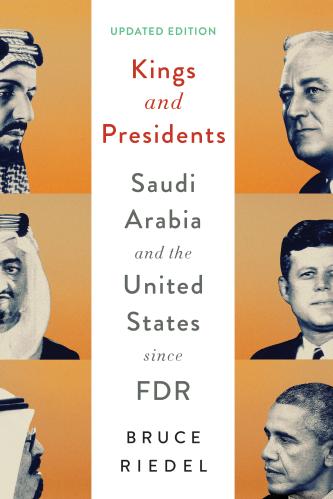

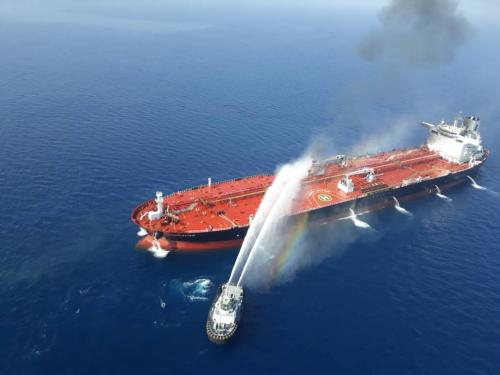
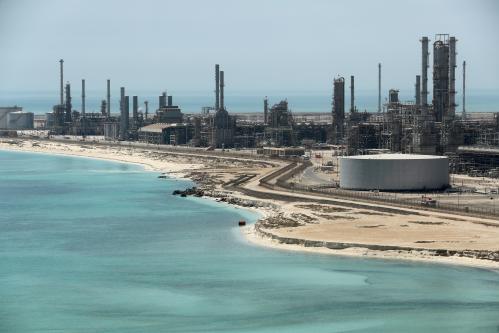
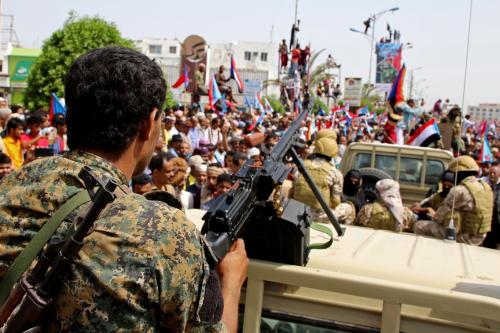




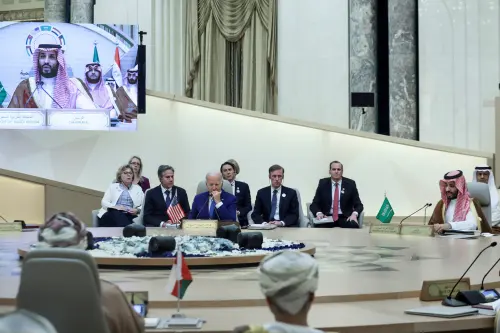
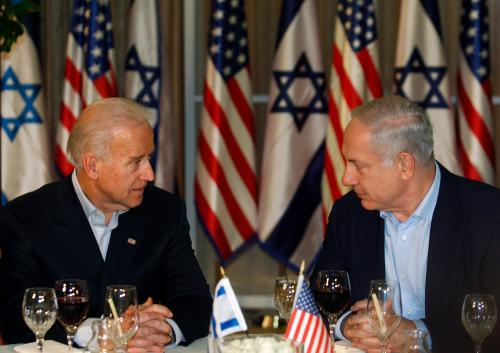
Commentary
Around the halls: Brookings experts react to the attack on Saudi oil facilities
September 17, 2019